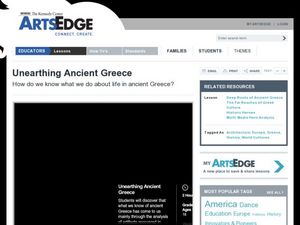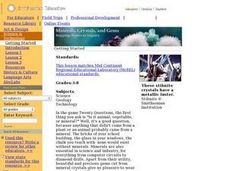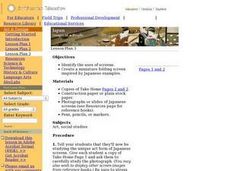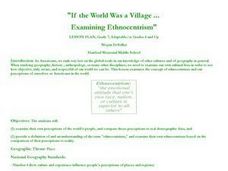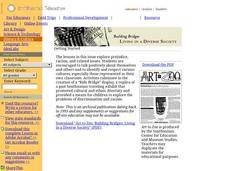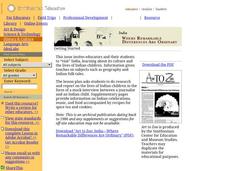Curated OER
Going...going...gone? Tropical Rainforests-How They Work, What They Do for Us, What's Being Done to Them...
Sixth graders explore the Tropical Rainforest and come to understand what it is and how it affects the ecosystem. In this rainforests lesson, 6th graders write about the Tropical Rainforest, imagine they are in the Tropical Rainforest,...
Curated OER
Exploring Explorations-Ocean Exploration
Students learn about Earth's deep ocean discoveries and their benefits. In this ocean exploration lesson, students review previous explorations of the Earth's deep oceans and learn about the discoveries of the past.
Curated OER
Cardiac Arrest! Using Forensics to Investigate Cardiovascular Anatomy and Function
Students identify the different parts and functions of the cardiovascular system. In this forensics lesson, students collect and analyze evidence on a fictional crime. They describe different causes of cardiac arrest.
Curated OER
Unearthing Ancient Greece
Students locate and analyze clues about ancient Greek life. In this ancient Greece lesson, students look at art, architecture, and artifacts to determine what was important to the Greeks and discover details about their culture. Students...
Curated OER
Plants and Animals: Partners in Pollination
Students identify the plant parts and bee structures that are involved in pollination. They simulate pollination in a group activity and process the information.
Curated OER
Minerals, Crystals, and Gems
Young scholars discover the relationships between minerals, crystals and gems. They bring in rocks that they find at home, in the schoolyard, etc. and examine them and attempt to identify them. They set up a classroom exhibit that...
Curated OER
Japan: Images of a People
Learners learn the geography of Japan and its location in reference to the United States.
Curated OER
JAPAN, IMAGES A PEOPLE
Students interpret Japanese and American paintings; evaluate paintings as sources of cultural and historical information
Curated OER
Views of the American West: True or False?
Students explain that a landscape painting may or may not accurately represent a specific place. They identify techniques that create the illusion of three-dimensional space on a flat surface.
Curated OER
Creation Mythology
Students construct a map from geographic data and explain relationships found in the information. Students identify ancient beliefs and customs through Hawaiian creation myths while comparing similarities and differences and appreciating...
Curated OER
If the World Was a Village...Examining Ethnocentrism
Seventh graders examine their own perceptions of world's people, compare those perceptions to real demographic data, provide definition and understanding of term "ethnocentrism," and examine their own ethnocentrism based on comparison of...
Curated OER
Climate and Cultures of Africa
Students gain an understanding of the relationship between climate and culture in the sub- Saharan Africa. Students will complete short exercises pertaining to the various cultures of Africa and the climate in which they live....
Curated OER
Dinosaurs Were Real!
Students investigate the history of dinosaurs, as real animals. For this dinosaur lesson plan, students examine basic concepts that help them understand the history of all life. Included in this article is information on the world of...
Curated OER
Art to Zoo: Celebration
Students research and develop a report on birthday rituals around the world. For this research lesson plan, students compare birthday rituals from other cultures to their own. Images and resources are included.
Curated OER
Lift and Drag: Principles of Flight and the Soaring Imagination
Students construct models of early gas balloons and gliders. In this balloon and glider lesson, students create models of early gas balloons and gliders, discover how the forces of lift and drag effect aircraft in flight, and put on...
Curated OER
Teaching With the Power of Objects
Students define value of an object. For this value lesson plan, students identify reasons for collecting objects, compile a personal inventory of items they find valuable, and then define why those items are valuable to them. In step...
Curated OER
Building Bridges: Living in a Diverse Society
Young scholars participate in various activities that help them build esteem, and explore racism. In this multicultural lesson plan, Students increase their awareness of, and appreciation for, cultural differences and similarities. ...
Curated OER
History Close to Home: Creating Your Own Special Museum
Students create their own museum exhibit. For this museum creation lesson plan, students research their local history so they can decide on a theme for their exhibit and what objects they will use in order to design a museum exhibit. A...
Curated OER
India: Where Remarkable Differences Are Ordinary
Students research India and Indian culture. In this Indian research lesson plan, students research and report on the lives of Indian children. The report will be in the form of a mock interview between a journalist and an Indian child....
Curated OER
Learning from Letters and Other Mail
Students explore the history of our mail system. For this postal lesson plan, students evaluate mail as a means of communication, create a mail system in their classroom where they can send and receive mail. Once the students receive...
Curated OER
Playing Historical Detective: Great Grandmother's Dress and Other Clues to the Life and Times of Annie Steel
Pupils draw conclusions about an mystery person based on documents and artifacts provided. In this drawing conclusions activity, students become detectives by reading and analyzing evidence provided. This activity includes information...
Curated OER
Water and Ice
Students examine how water changes state, from a liquid to a solid. In this water instructional activity students study the water cycle and how temperature and pressure effect it.
Curated OER
Water and Ice
Students observe what happens to water as it goes from a solid to a liquid. In this exploratory lesson students gain an understanding for the water cycle while working in groups observing what happens to water as it changes...





